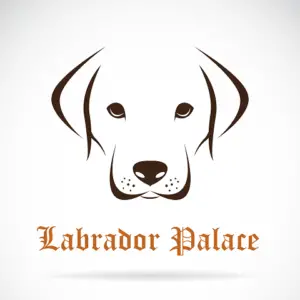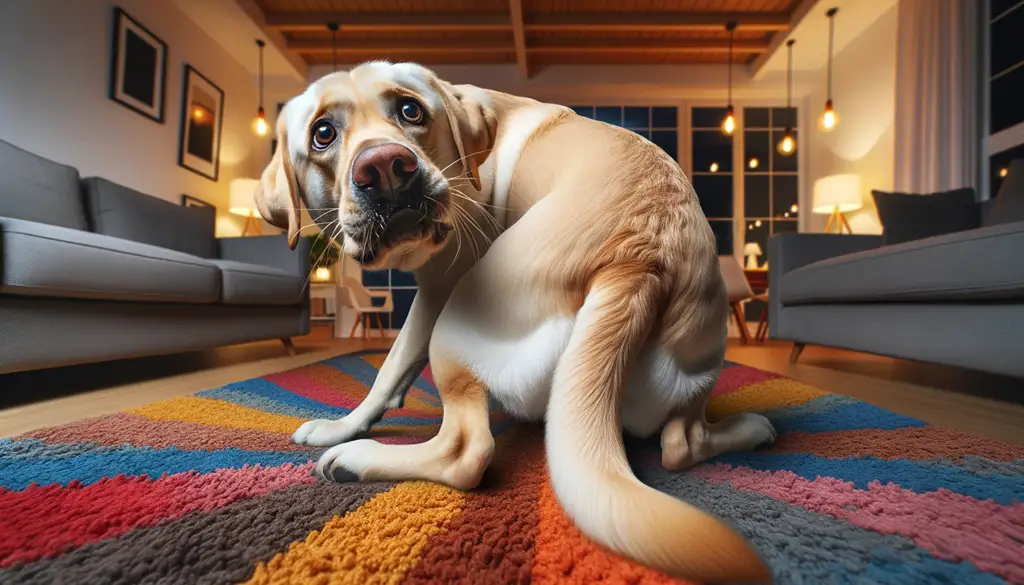If you’re watching your Labrador scoot his bum across the floor, it’s important to understand that this behavior is usually indicative of some underlying health issue. This could range from parasites to allergies. According to PetMD, “When a dog is scooting or dragging its bottom along the ground, it could be a sign of a few possible issues, including but not limited to anal sac problems, worms, and other parasites, allergies, or skin disease.” Therefore, it’s crucial to pay attention to this behavior, as it can provide key insights into your Labrador’s health and let you know when it’s time to seek professional help from a vet.
Common Causes of Labrador Scooting
In tackling the issue of Labradors scooting, I’ve come across several common causes that I’ll break down for you. Anal gland issues, parasitic infections, allergic reactions, and dietary concerns can all trigger this behavior.
Let’s start with anal gland issues. These are two small, pea-sized glands located inside your Labrador’s anus. They secrete a smelly substance that dogs use to mark their territory. Sometimes, these glands can get blocked or infected, causing discomfort and leading to scooting. If your Labrador is scooting frequently or seems to be in pain, it’s worth having a vet check their anal glands.
Parasitic infections, specifically tapeworms and other intestinal parasites, can also cause scooting. They irritate the rectal area, leading to itching and discomfort. Regular deworming can help prevent these infections.
Next up, allergic reactions. Some Labradors have allergies to certain types of food or environmental factors, like pollen or dust mites. These allergies can cause skin irritation, including in the anal area, leading to scooting. If you notice your Labrador scooting along with other signs of allergies – like itching, redness, or swelling – you should consult with a vet.
Finally, dietary concerns can cause scooting. A diet that’s too high in fat can lead to loose stools, which can irritate the anal area. On the other hand, a diet that’s too low in fiber can lead to constipation, which can also result in scooting. Ensuring your Labrador has a balanced diet can help prevent this problem.
Understanding Canine Scooting Behavior
Now that we’ve covered the common causes of Labradors scooting, let’s dig a bit deeper into understanding this canine behavior.
The act of a dog dragging its rear end across the floor, known as scooting, is more than just an awkward sight. It’s a form of canine communication, signaling that something is uncomfortable or painful for your pet. A key aspect of understanding this behavior is carrying out a behavior analysis to identify any patterns or triggers.
Here’s a breakdown of the elements to consider:
- Frequency of Scooting: How often is your Labrador scooting? Regular scooting is a clear sign that something is wrong and needs immediate attention.
- Behavioral Changes: Has your Labrador’s behavior changed in other ways? Changes in eating habits, lethargy, or aggression can all be signs of discomfort or distress.
- Physical Symptoms: Are there any visible signs of discomfort, like redness, swelling, or sores?
- Vet Consultation: It’s crucial to consult with a vet for a professional diagnosis. They can provide suitable treatment options and advise on scooting prevention measures.
Understanding the scooting consequences is paramount. Ignoring this behavior can lead to severe health problems, like skin infections or anal gland impactions, which are painful and can be dangerous if left untreated.
When to Seek Veterinary Help
As a responsible pet owner, I can’t stress enough the importance of seeking veterinary help immediately if my Labrador’s scooting behavior becomes frequent or is accompanied by other signs of discomfort. Understanding when to seek a vet consultation can be a lifesaver, so it’s crucial to be mindful and observant of your pup’s actions and demeanor.
Emergency signs to look out for include excessive licking or biting at the rear end, visible signs of pain, or traces of blood in their stool or on the floor where they’ve been scooting. A drastic change in behaviour or loss of appetite can also be a worrisome indication. It’s important to act promptly, since these symptoms could point to severe issues such as anal gland infection, parasites, or even tumors.
During the vet consultation, the doctor will conduct a thorough examination to determine the root cause of the issue. This could involve a physical exam, stool test, or other diagnostics as needed. Based on the diagnosis, your vet will discuss medication options and, if necessary, surgical interventions. It’s essential to follow their advice to ensure your Labrador’s health and comfort.

Frequently Asked Questions
What Breeds Other Than Labradors Commonly Exhibit Scooting Behavior?
Besides Labradors, many breeds show scooting behavior due to anal gland issues. It’s prevalent in small breeds like Pugs and Cocker Spaniels. Regular vet checkups and scooting prevention measures can help manage this behavior.
How Can Diet Affect a Labrador’s Scooting Behavior?
Diet can significantly impact a labrador’s scooting behavior. Dietary changes can alleviate discomfort, while allergy identification may reveal food intolerances. Nutritional supplements and probiotics benefits also play a crucial role in enhancing their digestive health.
Are There Any Home Remedies for Reducing Scooting in Labradors?
Yes, there are home remedies for reducing scooting. Regular hygiene practices can prevent anal gland issues. A diet change can help if there’re allergic reactions. And prompt treatment of parasitic infestations is also crucial.
Is There a Certain Age When Labradors Tend to Start or Stop Scooting?
There’s no specific age when Labradors start or stop scooting. Scooting triggers can occur anytime, depending on Labrador hygiene, parasitic infections or anal gland issues. It’s vital to monitor these factors regularly.
Conclusion
In my quest, I’ve uncovered that a Labrador scooting isn’t just a comical scene. It’s often a sign of discomfort, possibly due to anal gland issues, parasites or allergies. It’s crucial to monitor such behavior and consult a vet when needed. Remember, our canine companions can’t express their discomfort like we do, so it’s up to us to be their voice and ensure their well-being. Let’s keep our Labradors healthy, happy, and free from dragging their bums on the floor!


